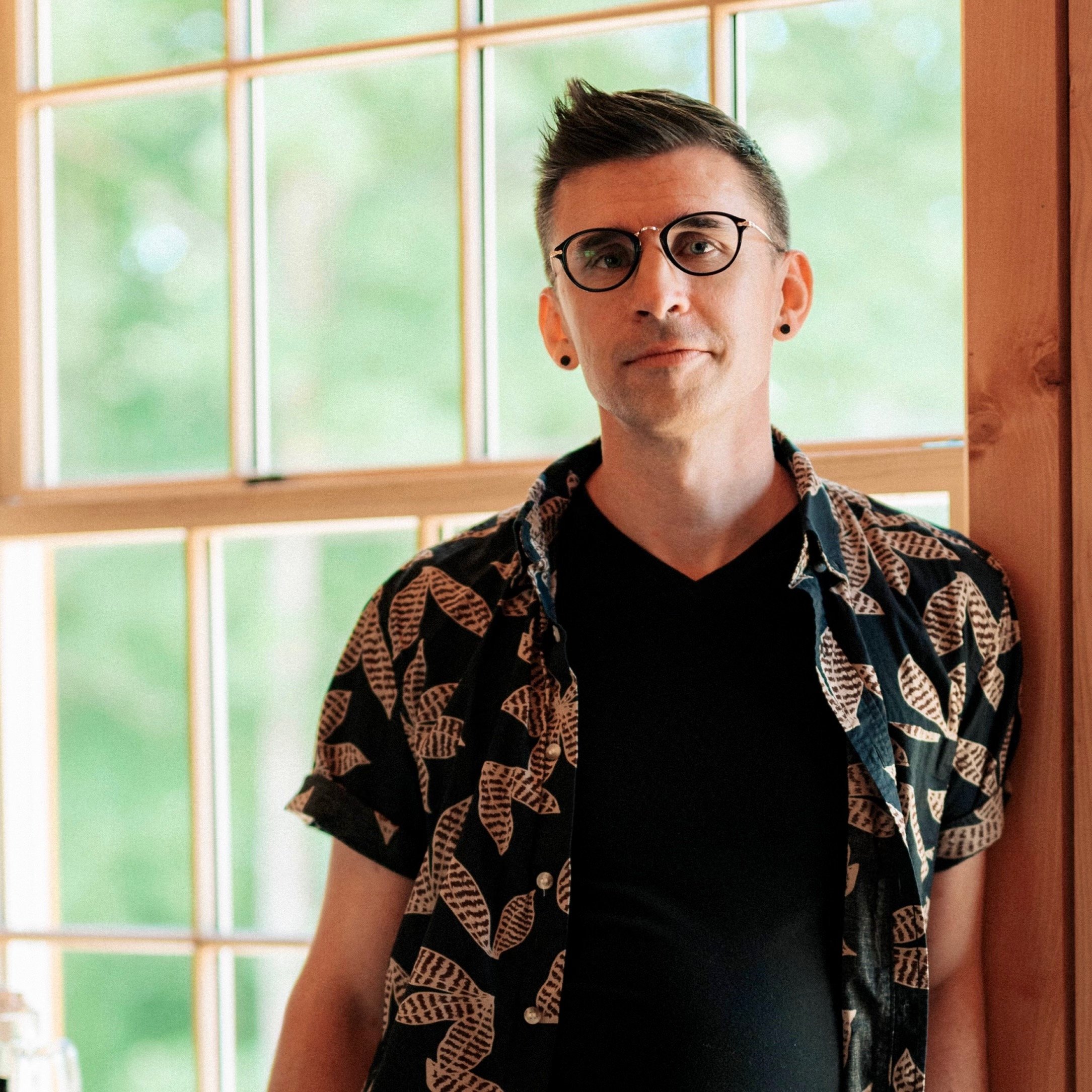Benedict Sheehan’s sublime new oratorio, Akathist, was recorded last fall at New York’s historic Trinity Church with The Choir of Trinity Wall Street, Artefact Ensemble, NOVUS NY and others. The groundbreaking work weaves together medieval chant, Anglo-American hymns, gospel, and jazz – offering a unique perspective on sacred music and a radically constructive response to injustice and evil. Akathist asks us to meet the world’s brokenness with gratitude and healing, and thereby to transform ourselves.
“It is magic, it lends confidence to believers irrespective of religion – I hope – which was Sheehan’s aim. I hope he is satisfied with the result. I also hope readers with faith in what is good in our world will find some comfort in this music – in particular today, when we observe what is happening all around us.”
— MusicWeb International
Get the album!
Found on the body of a murdered priest in a labor camp at the height of Stalin’s “Great Purge” in 1937–38, the text of Akathist nonetheless glorifies God for birth, life, childhood, the earth, mountains, meadows, sunrises, science, art, music, family, friends, animals, suffering, and even death: the totality of human experience. Sheehan’s setting of the hymn weaves together medieval chant, Anglo-American hymns, gospel, and jazz, offering a unique perspective on sacred music and a radically constructive response to injustice and evil. The composer comments:
“The music I have written for Akathist draws on a diverse array of sound-worlds, most of which have little to do with the Eastern Orthodox musical tradition. This was quite deliberate on my part. I see this text as a sort of universal anthem, a cry of hope arising perennially from every human heart, even from nature herself, and therefore not limited to a specific expression of faith. I have therefore enlisted a range of compositional techniques and styles in order to suggest that, in some way, all music is sacred and every musical style has something to tell us about God and about one another.”
Akathist is also about struggling with injustice, both past and present. That a universal hymn of thanksgiving could arise during one of history’s darkest moments inspired Sheehan to use his oratorio to address instances of injustice and cruelty in other times and places, specifically the Native American experience with colonization, the African American experience with slavery and racism, and the Jewish experience throughout the ages and especially in the 20th century. Overall, the work also focuses on the two themes of love of nature and the injustice that humans have perpetrated against it.
In the wondrous blending of soundS
"We believe choral singing is fundamental to the wellbeing of human society and of each human individual. It creates deep and abiding bonds of trust between people—often very quickly and efficiently—while at the same helping us learn to trust ourselves." --Talia Sheehan
In the wondrous blending of sounds it is thy call we hear. In the harmony of many voices, in the sublime beauty of music, in the glory of the works of great composers, thou art there showing us the threshold of the paradise that is to come. All true beauty has the power to draw the soul towards thee, and to make it sing in ecstasy: Alleluia!
Tryphon Turkestanov, trans. John Mikitish
Composer’s Note:
The central movement of Akathist: An Oratorio (2023), and the quiet beating heart of my own personal musical vision. A four-bar ostinato based on a Plainchant melody undergirds a gently ornamented vocal line inspired by South African folk music. When humans can look beyond their differences and collaborate on creating beauty—even if only for a moment—the world can feel like a paradise. —Benedict Sheehan
ARTIST BIOS
Benedict Sheehan, Composer
Two-time GRAMMY® nominee and American Prize–winner Benedict Sheehan has been called “a choral conductor and composer to watch in the 21st century” (ConcertoNet) and “a remarkable musician and composer” (Choral Journal). He is artistic director and founder of Artefact Ensemble and a full-time freelance composer. His works have been described as “brilliant” (Choir & Organ), “otherworldly” (Boston Musical Intelligencer), “evocative” (Gramophone), “extraordinary” (Limelight), and “simply beyond praise for excellence” (Fanfare). His music is published by Oxford University Press and others and has been performed by many of the world’s leading vocal ensembles, including Skylark, Conspirare, the Houston Chamber Choir, the Kansas City Chorale, the BBC Singers, and many others.
In some of his recent works, Sheehan has delved into issues of current sociopolitical significance. Among these are his 2022 setting of the African American manifesto Credo by W. E. B. DuBois for Conspirare and his recently completed Ukrainian War Requiem, written for Axios Men’s Ensemble and Pro Coro Canada in honor of those slain in the ongoing Russian invasion of Ukraine. Sheehan is also a person who stutters. In recent years he has become a passionate advocate for people in the arts with disabilities and speech differences, and his projects and ensembles have become known within the choral community as welcoming, inclusive, and life-affirming spaces for musicians and audiences alike. He lives and works in Pennsylvania with his wife and longtime musical collaborator, Talia Sheehan, and together they have seven daughters ranging in age from 7 to 23.
Elaine Kelly, Conductor
“Irish conductor Elaine Kelly is a discovery, tracing the musical lines with exactitude” (Los Angeles Times). Elaine Kelly is the Resident Conductor and Chorus Director of Irish National Opera (INO). She is an advocate for discovering contemporary operas, conducting works by Donnacha Dennehy, David Cooney, Amanda Feery, and Evangelia Rigaki and this year premiering an operatic double bill by composer Emma O’Halloran in the PROTOTYPE Festival New York (January) and with LA Opera (April). She conducted nine new works by Irish composers in INO’s internationally praised 20 Shots of Opera in 2020, praised in The Wall Street Journal as “an exhilarating jaunt through up-to-the-minute lyric creativity.” Most recently, she conducted Faust (Gounod) and performances of Così fan tutte (Mozart) with Irish National Opera in the Gaiety Theatre, Dublin and Dawn to Dusk: The Moon Is Listening (Richard Taylor) with Garsington Opera, U.K. She has also worked on the operas La cenerentola (Rossini), The Abduction from the Seraglio (Mozart), La bohème (Puccini), Elektra (Strauss), Alice’s Adventures Under Ground (Barry), Fidelio (Beethoven), Carmen (Bizet), Maria Stuarda (Donizetti), William Tell (Rossini), and Der Rosenkavalier (Strauss) as well as a nationwide tour of The Lighthouse (Peter Maxwell Davies) with Irish National Opera and on L’Elisir d’Amore (Donizetti) with Opera National de Bordeaux. Kelly has guest appeared with the National Symphony Orchestra of Ireland, RTÉ Concert Orchestra, Cork Concert Orchestra, and Cork Opera House Concert Orchestra and held the position of Music Director with the Dublin Symphony Orchestra and the University of Limerick Orchestra. In 2014, Kelly won First prize in the inaugural ESB Feis Ceoil Orchestral Conducting Competition.
The Choir of Trinity Wall Street
Peerless interpreters of both early and new music, The Choir of Trinity Wall Street has redefined the realm of 21st-century vocal music, breaking new ground with artistry described as “blazing with vigour...a choir from heaven” (The Times, London). This premier professional ensemble can be heard live, online, and in services, recordings, and performances described as “thrilling” (The New Yorker), “musically top-notch” (The Wall Street Journal), and “simply superb” (The New York Times). The Choir of Trinity Wall Street leads liturgical music at Trinity Church on Sundays and Major Feasts, and at additional services throughout the year, all of which are livestreamed, providing access to a wide audience. In 2020–2022, musical excerpts were featured weekly on Trinity’s Comfort at One series. These concerts included a partnership with Amplify Female Composers to bring more music by women composers into the sacred music canon. A typical season for the choir includes performing in Bach at One, Compline by Candlelight, and many other concerts and festivals throughout the year, often with NOVUS NY, the Trinity Baroque Orchestra, and the Trinity Youth Chorus. The choir anchors Trinity’s critically acclaimed performances of Handel’s Messiah, which The New York Times referred to as “the best Messiah in New York.” Recent season highlights include a full production of Craig Hella Johnson’s Considering Matthew Shepard, Handel’s Theodora at Caramoor, Julia Wolfe’s Anthracite Fields at Carnegie Hall, Tyshawn Sorey’s Monochromatic Light at the Park Avenue Armory, Notes from Ukraine at Carnegie Hall, Bach cantatas at Salle Bourgie in Montreal, and collaborations with the Orchestra of St. Luke’s and the American Modern Opera Company. The choir has toured extensively throughout the United States, making appearances at Carnegie Hall, Lincoln Center, the Metropolitan Museum of Art, the Shed at Hudson Yards, the Kennedy Center, Walt Disney Concert Hall, and the PROTOTYPE Festival, with partners such as Bang on a Can All-Stars, the New York Philharmonic, and the Rolling Stones. In demand internationally, the choir has also performed at Paris’s Théâtre des Champs-Élysées, Norway’s Stavanger Cathedral, and London’s Barbican Theatre. In addition to the GRAMMY Award–nominated recordings Luna Pearl Woolf: Fire and Flood and Handel’s Israel in Egypt, The Choir of Trinity Wall Street has released recordings on Naxos, Musica Omnia, Pentatone, VIA Recordings, ARSIS, Avie Records, Acis, Cantaloupe Music, Decca Gold, and Philip Glass’s Orange Mountain Music. Trinity’s long-term commitment to new music has led to many collaborations with living composers, including Ellen Reid, Du Yun, Trevor Weston, Paola Prestini, Luna Pearl Woolf, Ralf Yusuf Gawlick, Elena Ruehr, and Julia Wolfe, whose Pulitzer Prize–winning and GRAMMY-nominated work Anthracite Fields was recorded with the choir. Along with NOVUS NY, the choir also collaborated on and recorded two Pulitzer Prize–winning operas: Du Yun’s Angel’s Bone and Reid’s p r i s m.
NOVUS NY
Trinity Church Wall Street’s new music orchestra, NOVUS NY, is a key player on the contemporary music scene. These “expert and versatile musicians” (The New Yorker) perform new music from all corners of the repertoire, meeting “every challenge with an impressive combination of discipline and imagination” (New York Classical Review). The orchestra’s Carnegie Hall debut, made with a formidable pairing of Ives and Ginastera, prompted The New York Times to declare that “adventure and ambition go hand in hand at Trinity Wall Street.” With its annual appearances at the PROTOTYPE Festival, New York’s premier celebration of contemporary opera, NOVUS NY and Trinity Church Wall Street have partnered in the development of several major new works. These include Emma O’Halloran’s newest opera pairing Trade and Mary Motorhead; Du Yun’s Angel’s Bone, winner of the 2017 Pulitzer Prize for Music; and Missy Mazzoli and Royce Vavrek’s Breaking the Waves, named “Best New Opera for 2016” by the Music Critics Association of North America. NOVUS NY recorded and performed in the East Coast premiere of Ellen Reid and librettist Roxie Perkins’s p r i s m, which won the Pulitzer Prize for Music in 2019. Additional Prototype highlights include the ensemble’s East Coast premiere of Reid’s Dreams of the New World and the world premiere of David T. Little’s revised version of Am I Born, which was recorded with NOVUS NY and The Choir of Trinity Wall Street. NOVUS NY has forged strong links with many of today’s leading composers, collaborating with Paola Prestini, Sarah Kirkland Snider, Daniel Felsenfeld, and Jonathan Newman on Trinity’s “Mass Reimaginings” commissioning project and giving world premiere performances of Laura Schwendinger’s opera Artemisia and Prestini’s interdisciplinary The Hubble Cantata, which drew an open-air audience of thousands to Brooklyn’s Prospect Park. The ensemble’s recent recordings include the GRAMMY-nominated LUNA PEARL WOOLF: Fire and Flood; Prestini’s The Hubble Cantata; Du Yun’s Angel’s Bone; Trevor Weston’s Choral Works; Elena Ruehr: Averno; Edward Thomas’s new opera Anna Christie; Reid’s p r i s m; and Glass’s Symphony No. 5.
Downtown Voices
Praised by The New York Times for its “incisive, agile strength,” Downtown Voices is a semiprofessional choir made up of volunteer singers and GRAMMY-nominated members of The Choir of Trinity Wall Street. Directed by Stephen Sands since its 2015 inception, Downtown Voices has performed works by Beethoven, Brahms, Rachmaninoff, Webern, Janácek, Arvo Pärt, Alberto Ginastera, Adolphus Hailstork, James MacMillan, and Philip Glass. Downtown Voices made its Carnegie Hall debut with the Buffalo Philharmonic under the direction of JoAnn Falleta as a feature of the Lukas Foss Centennial Celebration. Alongside The Choir of Trinity Wall Street, its members performed Foss’s Psalms and Alleluia by Foss’s teacher Randall Thompson. New York Classical Review described the performance as “a marvel of well-supported tone, lucid diction, and...smart, détaché articulation.” Recent highlights include a performance titled “Anthems” that featured David Lang’s national anthems, Ola Gjeilo’s Dark and Luminous Night, Jenni Brandon’s Tonight a Stolen Moment, and Undine Smith Moore’s We Shall Walk Through the Valley. Downtown Voices also performed in a community concert of “Holiday Favorites” that showcased all of Trinity’s ensembles in “Compline by Candlelight: Lessons and Carols,” featuring St. Paul’s Chapel Choir and the Trinity Youth Chorus, and as a part of Andrea Bocelli’s “A Family Christmas” tour at Madison Square Garden. Past performances have included “Compline by Candlelight, Lux Aeterna” (Requiems by Fauré and Duruflé), Community Carol Sing concerts, Pärt’s Passio, Beethoven’s Mass in C, Dvorák’s Mass in D, and Britten’s Hymn to St. Cecilia. The choir has also been featured in such collaborations as Carl Orff’s Carmina Burana at the Ross Farm in Basking Ridge, New Jersey; Beethoven’s Symphony No. 9 at the Church of St. Paul and St. Andrew; and Mark Morris Dance Group’s production of L’Allegro. Downtown Voices can be heard on Trinity’s epic recording of Glass’s Symphony No. 5, released by Orange Mountain Music.
Trinity Youth Chorus
The Trinity Youth Chorus brings together talented youth ages 5 to 18 from the five boroughs of New York City. Choristers receive individual and group training in vocal technique, music theory, sight-reading, and performance skills from a group of dedicated professionals led by Melissa Attebury, Trinity’s Director of Music. The choristers provide musical leadership for Sunday 9am Family services and offer concerts throughout the season, often performing with Trinity’s professional ensembles, including The Choir of Trinity Wall Street. Recent highlights include Carl Orff’s Carmina Burana, Leonard Bernstein’s Chichester Psalms, a fully staged production of Benjamin Britten’s Noye’s Fludde, Ellen Reid’s Winter’s Child at the Prototype Festival, Alberto Ginastera’s Turbae ad Passionem Gregorianam and Gustav Mahler’s Symphony No. 8 at Carnegie Hall, and Benjamin Britten’s War Requiem with the Queens College Choral Society. Recording projects include Philip Glass’s Symphony No. 5 and Lisa Bielawa’s My Outstretched Hand with the San Francisco Girls Chorus and The Knights. The Trinity Youth Chorus is featured in the films Love Is Strange and Doubt, as well as Bielawa’s made-for-TV opera Vireo; has sung backup for Josh Groban, the Rolling Stones, and Bobby McFerrin; and has been heard on Public Radio International and CBS’s The Early Show.
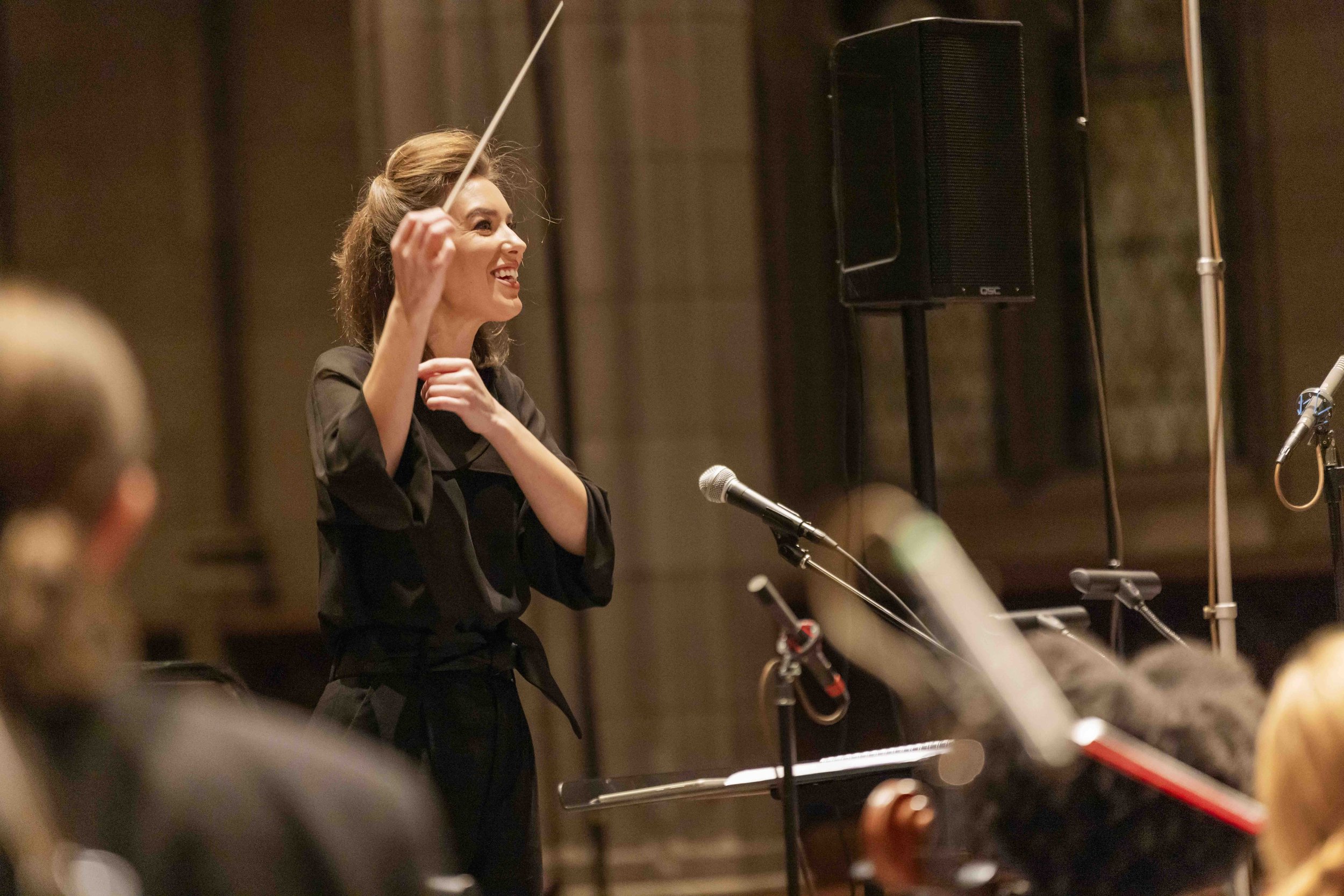
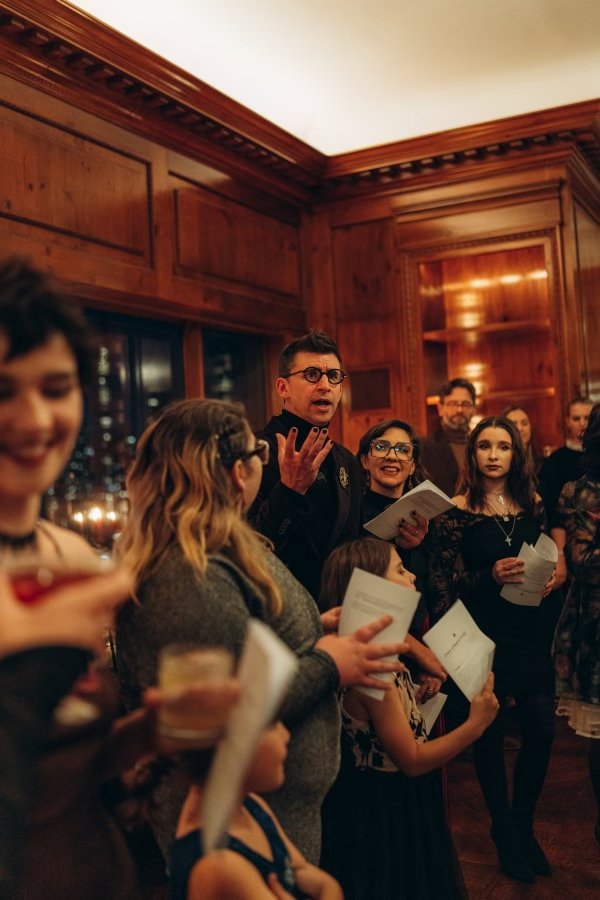
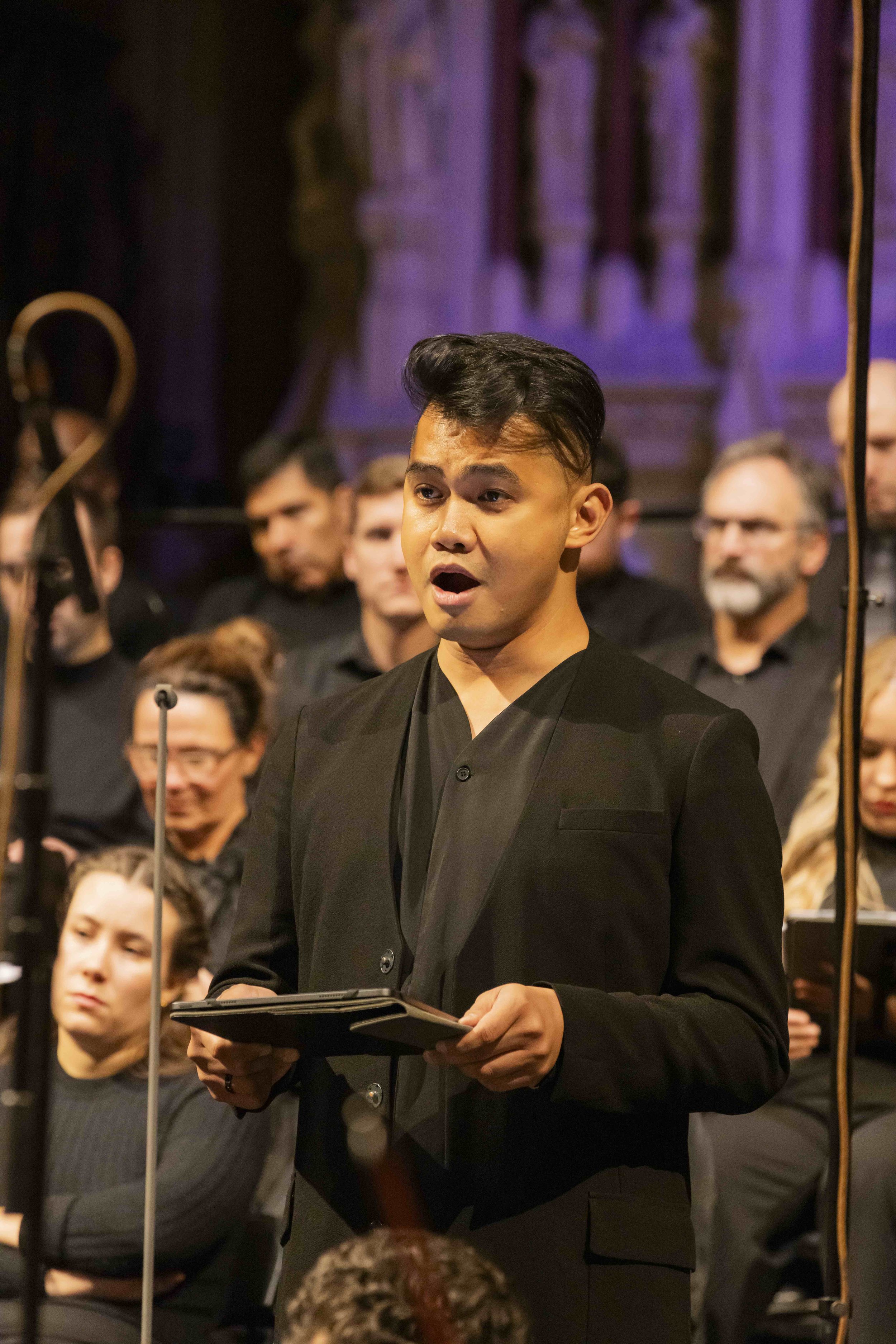
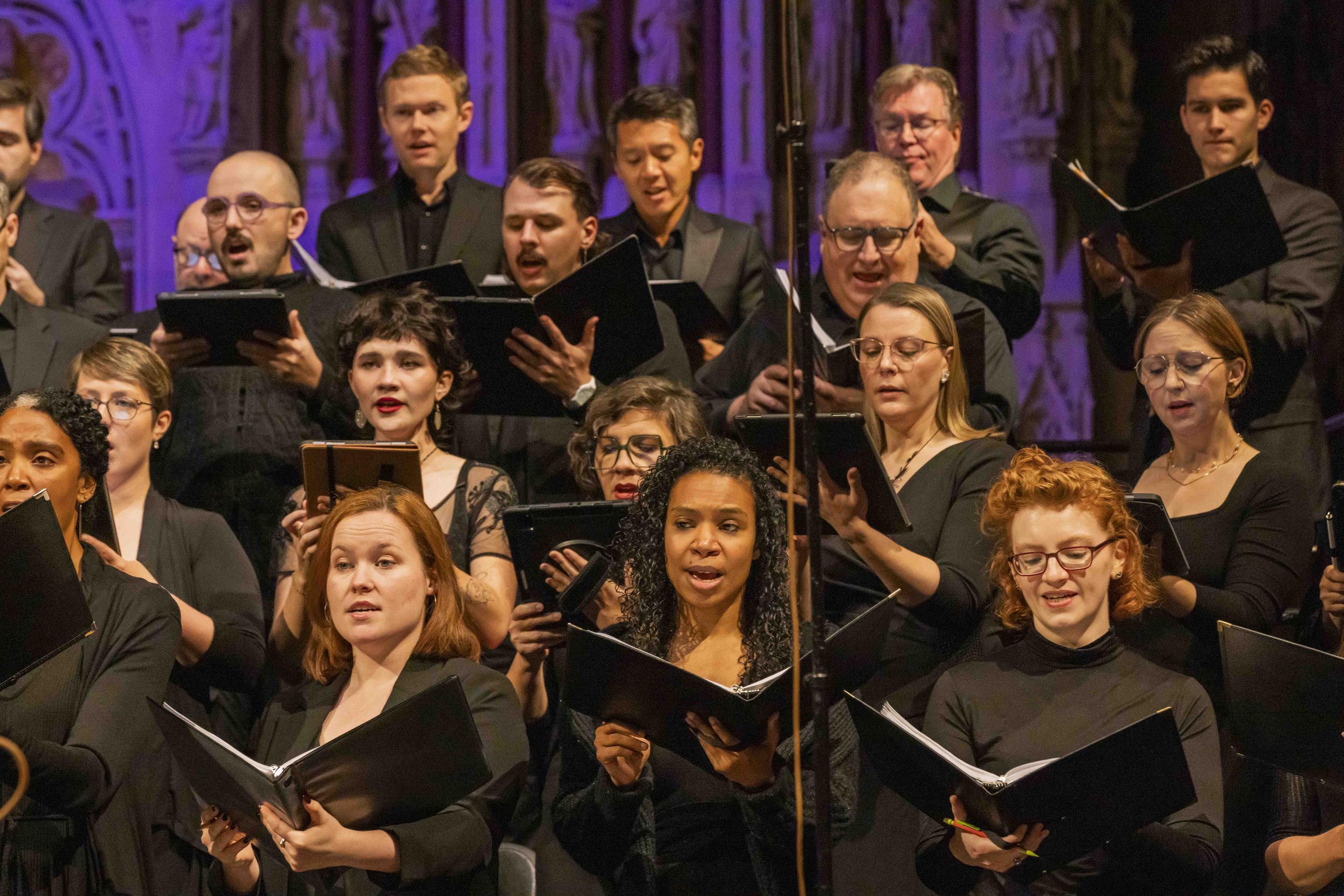
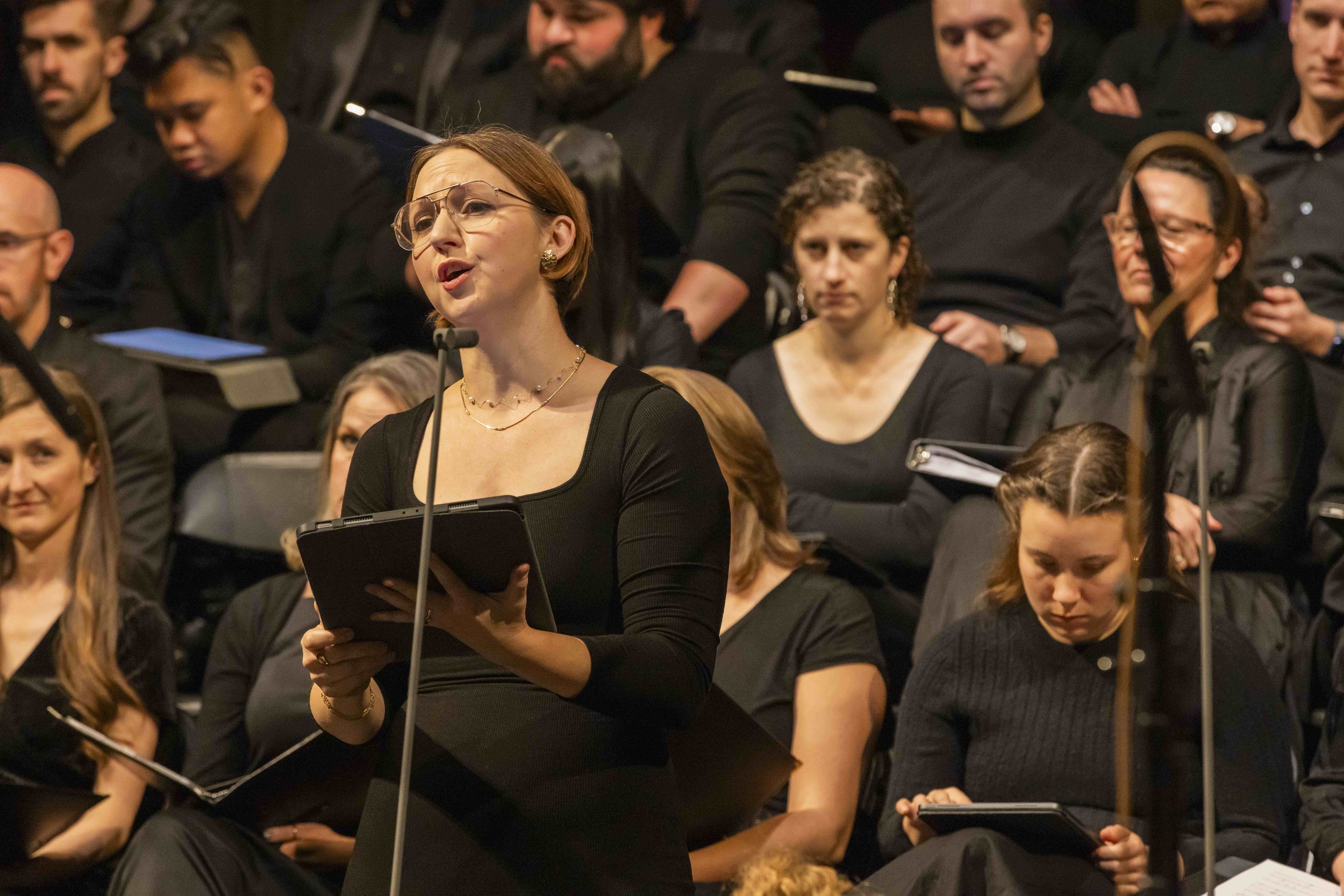
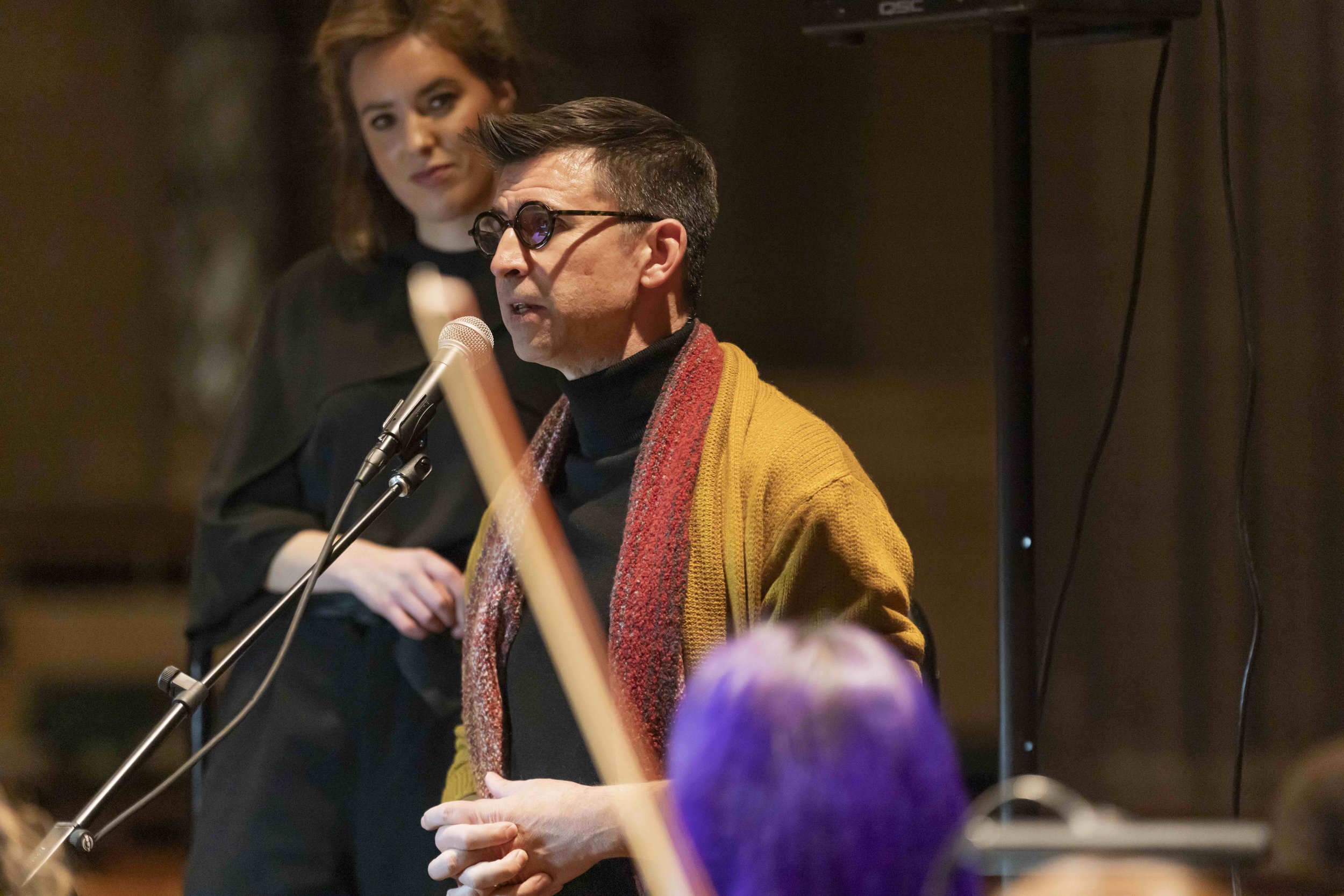

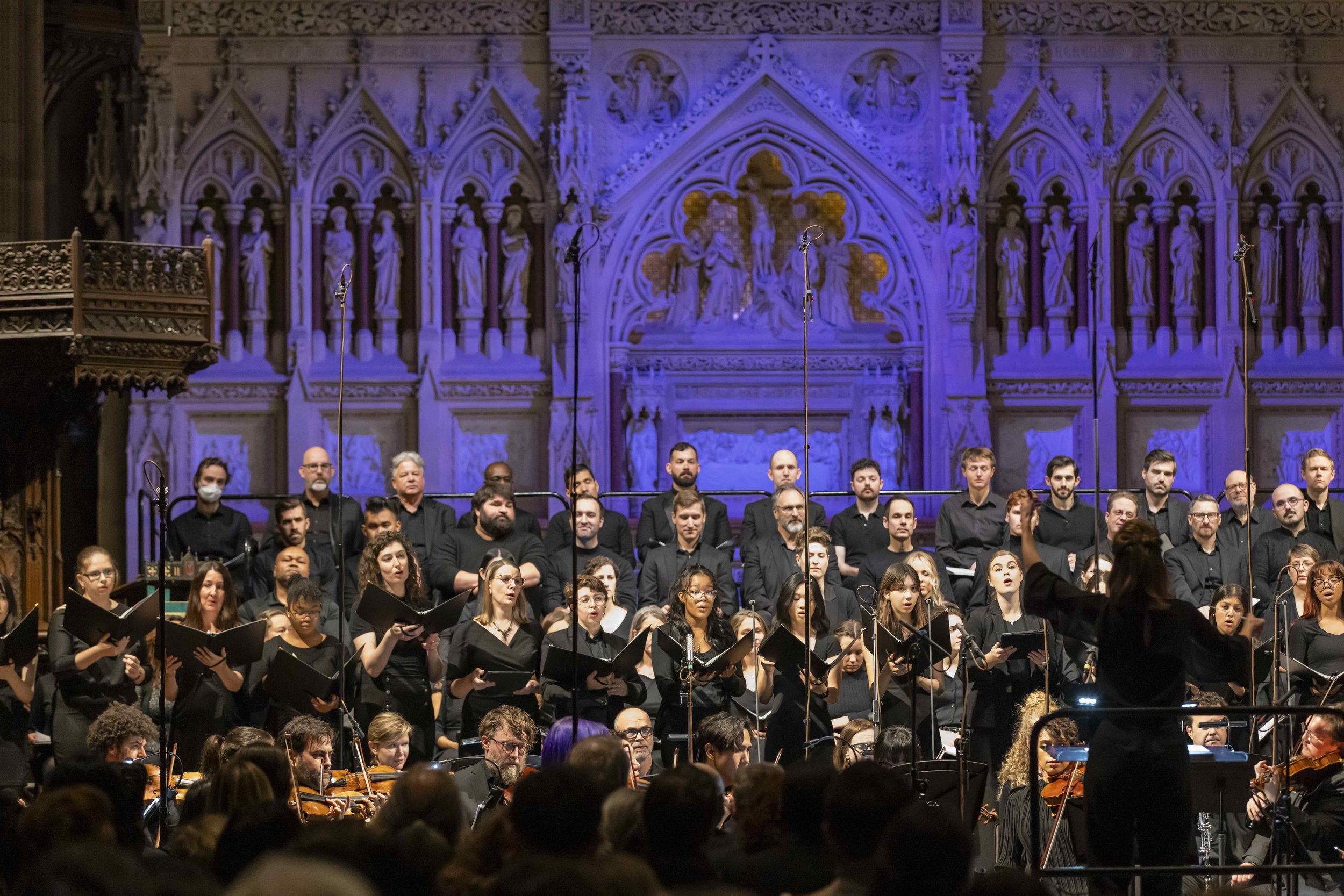
Thank you to our generous hosts & sponsors!
Music commissioned by:
Jonathan & Antoinette Russin
with additional underwriting support from:
The Rasmussen Family Foundation



